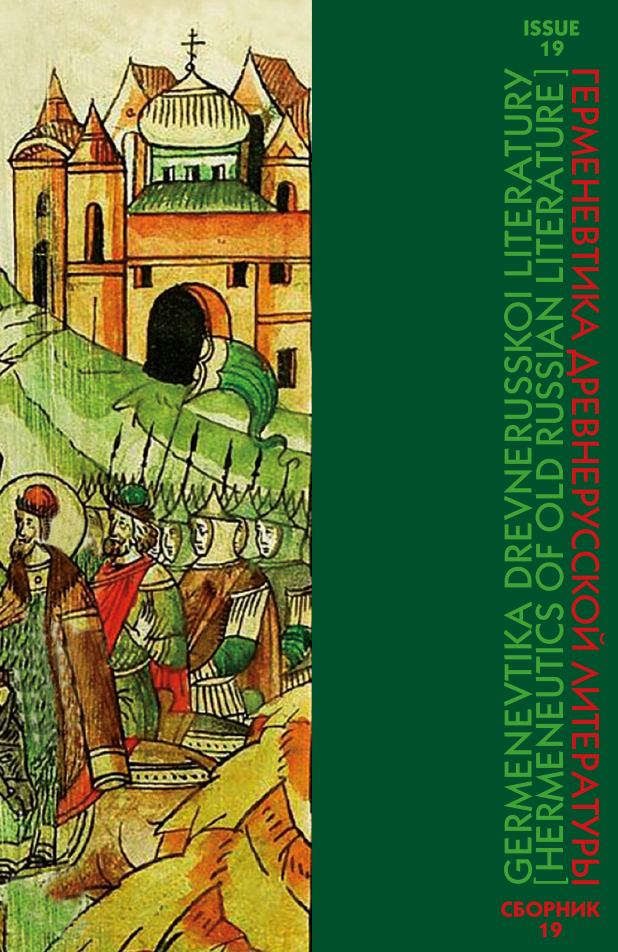Abstract
The article analyzes two important aspects for understanding Victor Sosnora’s poem Feast of Vladimir (1959). The aspects, misunderstood by the first critics, are the role of a minus-reception (answer of Prince Vladimir at the feast to the squad hidden by default) and a refrain (a call to beat the tambourine accompanying the feast). Sosnora uses allusions and associations and refers the reader, if he accepts the rules of poe’s game, to the works in the traditions of Old Russia and the avant-garde. The role of the minus-reception is explained in the context of the story about Vladimir’s feast from The Russian Primary Chronicle taken as the basis for the poem. The password “buben” (“tambourine”) repeated nine times refers to the name of Bozhidar’s poetry collection “Byben” (“Tambourine”) and, in general, to the elements of the Russian avant-garde of the 1910s, when the futurists experienced the death of Bozhidar, who committed suicide at the age of twenty. Sosnora demonstrates in the poems of the Horsemen the idea of poetry as resurrection magic dating back to the early avant-garde. The poet “revives” dead writings and heroes of early history, bringing them closer to modernity. Along the way, however, poetics and avant-garde poets of the “first call” are resurrected: only with their “assistance” the resurrection of Old Russia is possible.
REFERENCES
1 Gasparov, M.L. “Semen Kirsanov, znamenosets sovetskogo formalizma” [“Semyon Kirsanov, the Standard-bearer of Soviet Formalism”]. Kirsanov, S.I. Stikhotvoreniia i poemy. St. Petersburg, Akademicheskii proekt Publ., 2006, pp. 5–18. (Novaia biblioteka poeta) (In Russian)
2 Gasparov, M.L. “‘Shut’ A. Belogo i poetika graficheskoi kompozitsii” [“‘Jester’ by A. Bely and Poetics of Graphic Composition”]. Gasparov, M.L. Sobranie sochinenii: v 6 t. [Collected Works: in 6 vols.], vol. 4: Stikhovedenie [Poetry]. Moscow, Novoe literaturnoe obozrenie Publ., 2022, pp. 378–388. (In Russian)
3 Ditts, Vl. “Traditsii i sovremennost” [“Traditions and Modernity”]. Don, no. 11, 1970, pp. 170–176. (In Russian)
4 Kirillin, V.M. “Pereskaz Pokhvaly Vladimiru Sviatoslavichu, izvestnoi po ‘Povesti vremennykh let’ (996), ot litsa russkogo knizhnika serediny XVI veka” [“Retelling of the Praise to Vladimir Svyatoslavich, known from ‘The Russian Primary Chronicle’ (996), on Behalf of a Russian Scribe in the Middle of the 16th Century”]. Sretenskoe slovo, no. 3, 2022, Moscow, Sretenskaia dukhovnaia akademiia Publ., pp. 63–83. DOI: 10.55398/27826066_2022_3_63 (In Russian)
5 Kovaleva, T.I., and I.E. Loshchilov. “Stikhotvorenie Viktora Sosnory ‘Rogneda’: Istochnik siuzheta, poetika i konteksty” [“Victor Sosnora’s Poem ‘Rogneda’: Source of Plot, Poetics and Contexts”]. Petrov, S.G., and V.A. Romodanovskaia, eds. Literatura i istoriia v kontekste arkheografii [Literature and History in the Context of Archeography]. RAS, Siberian Branch, Institute of History, Novosibirsk, 2022, pp. 266–289. (In Russian)
6 Litvina, A.F., and F.B. Uspenskii. Pokhvala shchedrosti, chasha iz cherepa, zolotaia luda… Kontury russko-variazhskogo kul’turnogo vzaimodeistviia [Praise of Generosity, a Skull Bowl, a Golden Cape… Contours of Russian-Varangian Cultural Interaction]. Moscow, Izdatel’skii dom Vysshei shkoly ekonomiki Publ., 2018. 192 p. (In Russian)
7 Mikhailov, Al. “Tvorchestvo i eksperiment” [“Creativity and Experiment”]. Literatura i sovremennost’. Sb. 4. Stat’i o literature 1962–1964 gg. [Literature and Modernity, vol. 4. Articles on Literature 1962–1964]. Moscow, Izdatel’stvo khudozhestvennoi literatury Publ., 1963, pp. 226–266. (In Russian)
8 Osetrov, E. “Stikhi i gody” [“Poems and Years”]. Nash sovremennik, no. 12, 1964, pp. 104–109. (In Russian)
9 Portnov, V. “Po bylinam sego vremeni [Rets. na: Viktor Sosnora. ‘Ianvarskii liven’. Stikhi. ‘Sovetskii pisatel’.” M.‒L. 1962. 100 str.]” [“According to the Epics of this Time [Rev. on: Viktor Sosnora. ‘January Rain.’ Poetry. ‘Soviet Writer.’ Moscow‒ Leningrad 1962. 100 pages].” Novyi mir, no. 2, 1963, pp. 258‒261. (In Russian)
10 Russkaia poeziia “serebrianogo veka”, 1890–1917: Antologiia [Russian Poetry of the Silver Age, 1890–1917: an Anthology]. Moscow, Nauka Publ., 1993. 784 p. (In Russian)
11 Cherniakov, A. “Ianvarskii liven” [“January Downpour”]. V mire knig, no. 3, 1963, p. 31. (In Russian)






